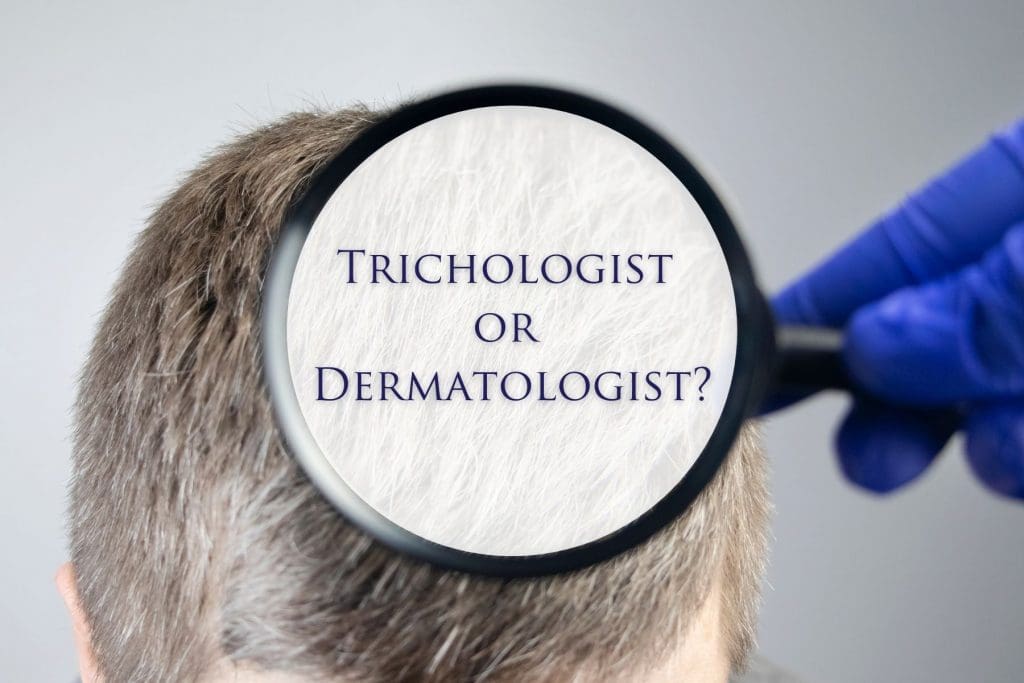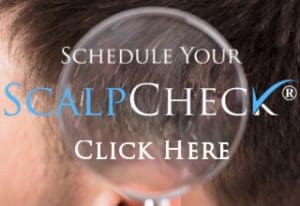A commonly asked question we hear is, “What is the difference between a trichologist and a dermatologist, and do I need a trichologist?” To answer this question, we must first look at what Trichology is and the difference between a dermatologist and a trichologist.
What is Trichology?
Trichology is the scientific study of hair, hair loss, and scalp problems. Trichology was first recognized as a para-medical or non-physician discipline in Britain in 1902.
Nearly a century later, Trichology is being recognized & practiced in the United States. Trichology is commonly thought of as a branch between cosmetology and dermatology.
What is a Dermatologist?
Dermatologists are doctors who specialize in conditions affecting the skin, hair, and nails. Some dermatologists are board-certified, meaning that they completed a minimum 3 year dermatology residency after medical school and passed the challenging exam given by the American Board of Dermatology.
Dermatologists train extensively to diagnose and treat more than 3,000 diseases of the skin, hair, and nails like acne, eczema, and skin cancer. For individuals experiencing hair loss or scalp problems, a dermatologist may be the first stop. They commonly recommend medically-based solutions for hair loss and scalp issues, such as Rogaine/minoxidil and topical prescriptions. Yet, not all dermatologists specialize in hair and scalp problems, limiting the type of solutions and detailed diagnosis they can offer.
What is a Trichologist?
A trichologist is truly a hair and scalp specialist. Their sole focus is the science of scalp and hair. Trichologists train on the anatomy of the scalp, hair structure and usually have a background in cosmetology. This training allows them to diagnose and recommend the best ways to treat different hair loss and scalp conditions. Some of the more common scalp and hair problems trichologists help with include:
- Excessive hair shedding and hair loss (Telogen Effluvium)
- Dermatitis and/or eczema
- Scalp itch
- Dandruff
- Oily scalp and hair
- Hereditary hair thinning
- Pre- and post-menopausal hair thinning
- Pre- and post-pregnancy hair thinning
- Stress or trauma-related hair thinning
- Distressed, damaged, weak hair
The best way to determine the health of your scalp and hair is with an in-depth hair & scalp analysis. During the examination, the trichologist should gauge the scalp’s health by evaluating factors like scalp tension, oil production, and hydration that can contribute to hair loss and scalp problems requiring correction. The scalp and hair are also examined using a specialized video scope camera allowing the trichologist to identify problems that cannot be detected by the naked eye alone.
Once the trichologist has assessed the scalp and hair, they may recommend a customized scalp and hair care treatment plan based on the individual’s specific needs. A trichologist is a highly trained specialist; however, they are not a doctor and cannot prescribe medications or perform medical procedures, like biopsies or bloodwork. They often work with patients and medical professionals, like general physicians and dermatologists, to help better understand hair loss, scalp problems, and how to treat them.
Qualified trichologists should be able to empathize with their patients. Sometimes individuals may feel more comfortable discussing hair and scalp problems with a trichologist instead of their general physician or dermatologist.
Do You Need A Trichologist or a Dermatologist?
In an ideal scenario, trichologists and dermatologists should work hand in hand. Many individuals often find that some of the greatest dermatologists are exceptional in their field; however, their specialties are usually not directed towards the hair and scalp. That is where a trichologist can become very valuable in helping to treat the hair or scalp condition.
As a general rule of thumb:
- Scalp Lesions=Dermatologist
- Areas of hair loss that are round in nature=Dermatologist or hair loss specialist
- Excessive hair shedding=Trichologist
- Scalp itch=Trichologist
- Excessive dandruff=Trichologist
- Oily scalp=Trichologist
- Dermatitis and/or eczema=Trichologist
Dermatologists are usually grateful to refer patients experiencing hair loss and scalp problems to a reputable trichologist. The trichologist’s specialty in hair and scalp ultimately allows the patient to experience a more focused approach to their hair and scalp problems allowing for a holistic solution to help correct or prevent the problem they are experiencing with their hair and scalp.
Now is a perfect time to schedule a ScalpCheck to discover your hair and scalp’s health and be sure seasonal shedding isn’t masking a longer-term hair loss problem.


